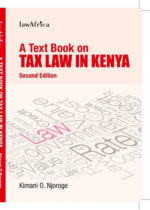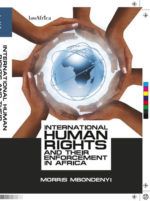The Industrial Court does in its endeavour to interpret the various sections of labour statutes. However, majority of these guidelines have not been made accessible to employers in a manner that is easily and properly understood and appreciated. This is because, even though there is an attempt to avail the decisions of the Industrial Court to the general public, the ratios and the guidelines thereof have not been analyzed in a short, concise and easier manner. This book seeks to address this gap by focusing on the realist perspective.
Employment Law Guide for Employers
KSh 1,665.00
The Industrial Court does in its endeavour to interpret the various sections of labour statutes. However, majority of these guidelines have not been made accessible to employers in a manner that is easily and properly understood and appreciated. This is because, even though there is an attempt to avail the decisions of the Industrial Court to the general public, the ratios and the guidelines thereof have not been analyzed in a short, concise and easier manner. This book seeks to address this gap by focusing on the realist perspective.
Related products
-
A Text Book on Tax Law in Kenya
KSh 2,980.00A Text Book on Tax Law in Kenya is a treatise on Kenyan tax law. It is a reference book for the training of advocates, accountants, tax agents, consultants, business owners, public among other professionals interacting with tax matters. It is an indispensable handbook for any professional pursuing a career in tax including the decision makers, Judges, Magistrates, and Tax Tribunals. It is an extensive summary of the tax law in Kenya and the tax jurisprudence emanating from Kenyan Courts and Tax Appeal Tribunal.
-
International Human Rights and their Enforcement in Africa-MORRIS MBONDENYI
KSh 2,400.00The main objective and purpose of this book therefore is to underscore the challenges besetting the effective enforcement of international human rights law in Africa and the prospects and promises of an effective regional human rights system. The book, a revised and updated version of my earlier book entitled The African System on Human and Peoples’ Rights: Its Promises, Prospects and Pitfalls, captures succinctly the recent developments of the system, since the publication of its predecessor. This is done with the understanding that the African human rights system is gradually progressing, despite the fact that it is not only the least developed but also the least effective as compared with its American and European counterparts.
-
Cases and Materials on Insurance Law
KSh 34,760.00This Ninth Edition contains extensive updates, with new cases relevant for students anxious to acquire practical knowledge that can be quickly put to use when they enter the profession.
-
Equity and Trusts-DAVID BAKIBINGA
KSh 2,800.00The book provides an overview of equitable principles in Uganda and links this with the maxims of equity and the distinction between equitable and legal interests. The book will benefit students offering Equity and Trusts
and Estate Planning in East African universities as well as legal
practitioners, insurance, social security and corporate operators. -
International Intellectual Property in an Integrated World Economy (Aspen Casebook)
KSh 60,000.00International Intellectual Property in an Integrated World Economy, Fourth Edition by Frederick M. Abbott, Thomas Cottier, and Francis Gurry, provides a comprehensive treatment of the international intellectual property system across the spectrum of intellectual property rights and interests. It introduces the institutional architecture at the multilateral, regional/plurilateral, bilateral and national levels. For each form of IP, it addresses the technical legal rules and illustrative jurisprudence, as well as economic and social welfare implications. Each of the authors has played a role in the development and implementation of the international rules, and they bring their experience to bear in introducing students to the field.
New to the Fourth Edition:
- The latest developments in bilateral and regional agreements regulating intellectual property, including NAFTA 2.0 (USMCA), CPTPP, and CETA
- Important new judicial decisions, including the U.S. Supreme Court decision adopting international exhaustion of patents and CJEU decisions addressing trademarks, geographical indications, and copyright
- Developments in IP and human rights; IP and competition law; and IP and health
- The WTO panel report in the Australia-Tobacco case
Professors and students will benefit from:
- An approach to the international IP system that situates the rules within the broader context of international law and the public policy objectives that governments, industry, and interest groups are seeking to achieve
- Case law from international dispute settlement bodies, as well as from national and regional courts
- Discussion of patent, trademark, geographical indication, copyright, design, trade secret, and data protection; as well as plant variety protection, protection of genetic resources and traditional knowledge, and the role of open source
- An explanation of the new European Union Unitary Patent system
- Exploration of the increasingly important role of emerging market IP systems
- Materials to help students understand the disputes between the United States and China involving IP, investment, and transfer of technology
- Inclusion of important jurisprudential developments
-
THE NEW CONSTITUTIONAL LAW OF KENYA: PRINCIPLES, GOVERNMENT AND HUMAN RIGHTS
KSh 2,400.00On 27 August 2010, a new Constitution for Kenya was promulgated. The Constitution seeks to re-orient the country by establishing a robust dispensation for good democratic governance amenable to the exercise of human rights. This book is tailored to unveil to the reader the fundamental normative and institutional frameworks of Kenya’s new Constitution. Not only does it define key concepts in constitutional law, generally, it also details how government in Kenya has been restructured and re-organised to give effect to the traditional principles that form the basis of constitutional law.
The golden thread that cuts across the various chapters of the book is the emphasis that good constitutions anchor certain tenets that have garnered recognition as hallmarks of democratic dispensation.These hallmarks include the concept of separation of powers; the doctrine of the rule of law; constitutionalism and human rights. These attributes have largely been secured by the 2010 Constitution. Thus, this book is expected to contribute to this new promise by making knowledge on the Constitution accessible through breaking down and contextualising its provisions. It is certain to be useful to law and government students, lawyers, researchers and other persons who seek to understand the new constitutional order. Morris Kiwinda Mbondenyi, LL.D., LL.M. (UNISA), LL.B. (Moi), Senior Lecturer and Head of Department, African Nazarene University. J Osogo Ambani, LL.D. (Cand), LL.M. (UP), LL.B. (UoN), Lecturer, MoiUniversity School of Law. -
Criminal Law-William Musyoka
KSh 2,700.00This text is designed to expose the Kenyan law on criminal responsibility and to define the common and key offences created by Kenyan statutes. An attempt has been made to rely mainly on Kenyan case law, but there is reference to cases from the other East African countries and the rest of the Commonwealth. The book is meant for law students undertaking the LL.B. programme. Legal practitioners, judicial officers, law enforcement agents and other persons with an interest in criminal law and justice will also find it useful.
-
LEGAL PRACTICE MANAGEMENT
KSh 3,500.00This book seeks to illuminate the expansive nature of legal practice in the society. It is also aimed at provoking further debate, research and publication. The author draws from her knowledge and experience as an Advocate, Accountant, Certified Secretary and Governance expert.









Be the first to review “Employment Law Guide for Employers”